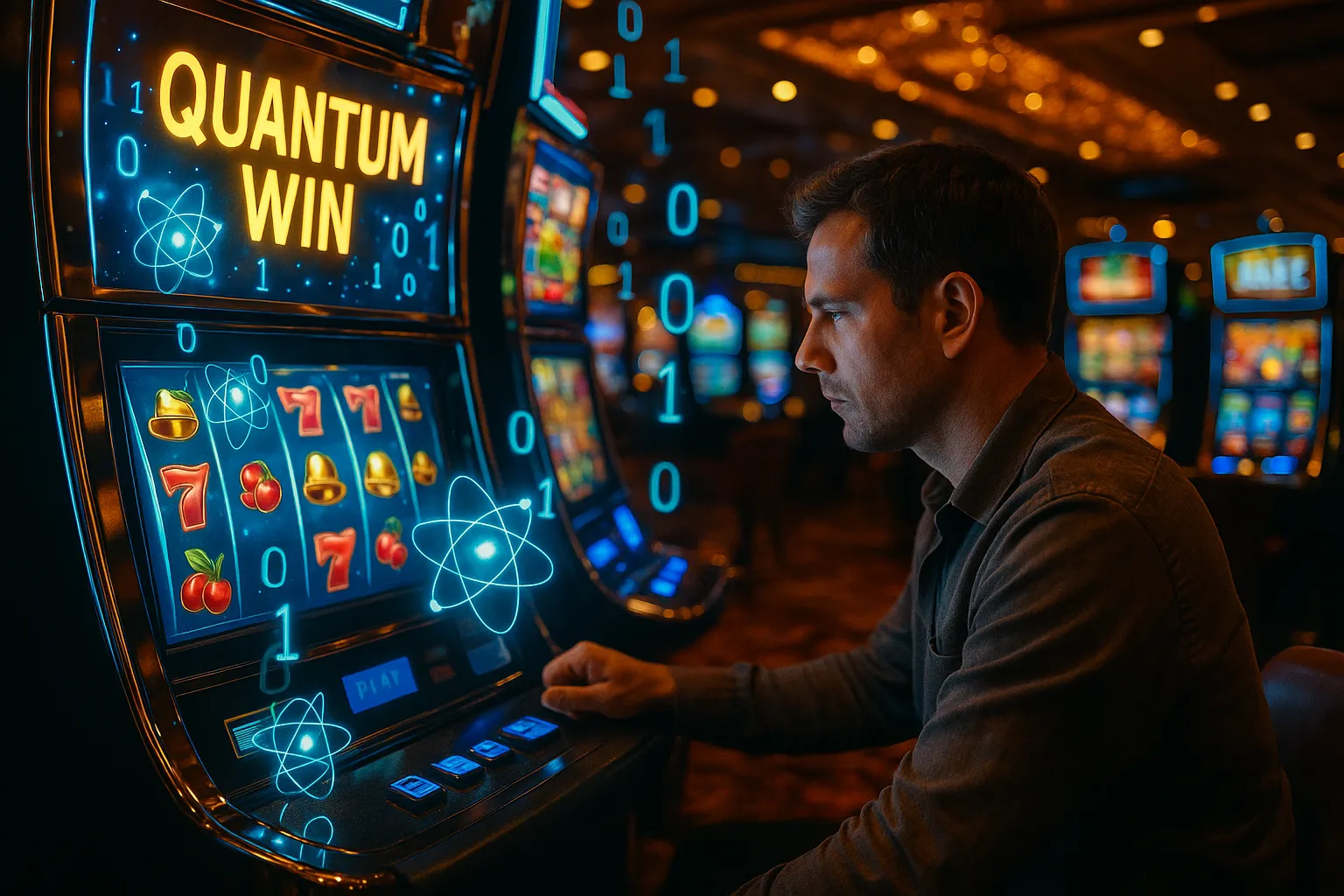Quantum mechanics feels like something out of a science-fiction novel. Yet today, the principles that govern the behavior of subatomic particles are being applied to one of the most ubiquitous forms of gambling entertainment: slot machines. At first glance, it might seem odd to connect quantum physics with a one-armed bandit in a neon-lit casino. However, the randomness inherent in quantum processes offers an unprecedented level of unpredictability—and for casino operators, unpredictability is the bedrock of fairness and excitement. In this article, we’ll explore what quantum random number generators (QRNGs) are, how they differ from traditional random number generators, and why they’re becoming a game-changer in modern gambling environments. Along the way, we’ll also touch on how QRNGs fit into the world of online casino gaming, including options for bettors looking for alternatives like betting sites not on GamStop.
Understanding Random Number Generation in Slot Machines
Slot machines, whether in land-based casinos or online platforms, rely on random number generators (RNGs) to determine the outcome of each spin. An RNG is essentially an algorithm that produces a sequence of numbers that cannot be predicted. For decades, these have been “pseudo-random”—algorithms built on mathematical formulas starting from a “seed” value. They generate long strings of numbers that appear random to a player. However, being algorithmic, pseudo-random number generators (PRNGs) are ultimately deterministic under the hood; if one knew the seed and the algorithm, outcomes could be predicted, at least in theory.
Enter the quantum realm: QRNGs take advantage of inherent uncertainty in quantum phenomena—such as the spin of an electron or the time a photon takes to pass through a beam splitter—to generate truly random numbers. Unlike PRNGs, which rely on complex mathematics, QRNGs harness fundamental physical unpredictability. When a photon hits a detector, it may register in detector A or detector B with precisely 50/50 chances. That unalterable randomness, dictated by quantum physics, is then captured and processed into the numerical sequences that feed slot machines.
How Quantum Random Number Generators Work
To appreciate QRNGs, let’s break down a simplified process:
Quantum Source: A device emits single photons—particles of light—one at a time.
Beam Splitter: Each photon encounters a beam splitter, a semi-transparent mirror that has a 50% chance of reflecting the photon and a 50% chance of transmitting it.
Detector Interaction: Depending on whether the photon reflects or transmits, it hits one of two photon detectors. These detectors register the arrival as either a “0” or “1”—the fundamental bits for binary data.
Post-Processing: The raw stream of bits from the detectors is then refined through statistical tests and hashing algorithms to ensure uniform distribution and remove any bias. The result is a string of perfectly random numbers, which can then be scaled to the range needed by the slot’s payout algorithm.
Because quantum processes at the detector level are fundamentally unpredictable, QRNG outputs are unhackable and unreplicable. Even the most experienced hacker or accidental hardware glitch can’t defeat this system, since there’s no mathematical formula to reverse-engineer. This level of unpredictability is crucial for maintaining fairness and trust among bettors.
Traditional RNGs Versus Quantum RNGs
The main difference between traditional PRNGs and QRNGs is the source of randomness. PRNGs use deterministic algorithms. Provided with the same initial seed, they will always generate the same sequence of numbers. To prevent predictability, developers frequently change seeds, rely on hardware-entropy pools, or incorporate user input (mouse movement, keystroke intervals, etc.) to create more entropy. Despite these measures, sophisticated attackers or insider threats can sometimes reconstruct or predict sequences, leading to potential exploits.
QRNGs, by contrast, rely purely on quantum phenomena. Since quantum events cannot be predicted—even with complete knowledge of the system’s prior state—QRNGs deliver true randomness. From the standpoint of regulatory bodies and independent auditors, this is a huge advantage. When a casino can demonstrate that the underlying random number generator is based on irreversible quantum events, it boosts overall transparency and player confidence.
The Evolution of QRNGs in the Gaming Industry
You might be wondering: How did we get from theoretical quantum physics to practical slot machines? The answer lies in miniaturization and affordability. In the early 2000s, research institutions developed laboratory-scale QRNGs. These machines were bulky, expensive, and not suitable for commercial deployment. However, advances in photonic integration and semiconductor technology gradually shrank QRNG modules to pocket-sized devices with USB or PCIe interfaces.
By the late 2010s, a handful of forward-looking software providers partnered with quantum hardware startups to license QRNG modules. These modules plugged directly into casino server infrastructures. Randomness from the quantum source was fed into the server’s RNG pool, which, in turn, served both online and land-based slot platforms. Today, casinos in several regulated markets are rolling out QRNGs, often as a marketing point to underscore their commitment to fairness.
From my own visits to Europe’s major gambling hubs—Monte Carlo, Vienna, and London—I’ve noticed subtle posters declaring “Powered by Quantum RNG” on slot machine banks. It’s a selling point, akin to how restaurants boast about “ocean-fresh seafood.” Players pick machines labeled this way, believing their odds aren’t being manipulated by predictable algorithms.
Why QRNGs Matter for Casino Fairness
Fairness is the cornerstone of gambling. Without it, a casino cannot maintain its reputation or retain loyal players. In online gambling, fairness is often demonstrated through independent audits by third-party testing agencies like eCOGRA or iTech Labs. These agencies validate the integrity of the RNG—typically by analyzing large datasets of game outcomes and comparing them against expected statistical distributions.
With QRNGs, that audit process becomes more straightforward. Rather than relying on sample data to infer randomness, auditors can inspect the quantum hardware’s specifications, calibration protocols, and post-processing methods. The physical processes that generate bits are well-documented, and any malfunction or drift in the hardware can be immediately detected through built-in self-tests. In short, QRNGs provide a “provably fair” framework. There is no need to dig through terabytes of historical spin data; regulators can verify fairness at a hardware level.
Real-world players benefit from this increased transparency. One of my friends—a professional blackjack player turned slot enthusiast—confirmed that he feels more confident playing at casinos using quantum-based RNGs. According to him, “Knowing that my spin results are coming from actual subatomic randomness makes me trust the machine more than any PRNG.” That kind of trust keeps players engaged and willing to stake higher amounts.
Implementation Challenges and Costs
Despite their clear advantages, QRNGs haven’t become ubiquitous—yet. Why? The primary barrier is cost. Integrating QRNG hardware into existing casino servers requires upfront capital investment, which can reach tens of thousands of dollars per server node. Small and medium-sized operators often balk at these costs, especially when their existing PRNG solutions are already audited and approved by regulators.
Another challenge is technical integration. Quantum modules need careful calibration and environmental shielding. Vibrations, temperature fluctuations, or electromagnetic interference can introduce minor biases in the raw quantum output. Developers must implement robust error correction and unpredictability tests to ensure that any bias is eliminated before the numbers reach the game’s logic layer.
There’s also a human factor. Casino IT departments are staffed by experts in traditional IT and software engineering, not quantum physics. Training personnel to maintain or troubleshoot QRNG modules can be an additional cost, albeit one that diminishes as more user-friendly, plug-and-play QRNG devices come to market.
Use Cases: Land-Based Slots, Online Casinos, and Beyond
Land-based casinos in progressive jurisdictions—such as Malta, Gibraltar, and some U.S. states—are the early adopters of quantum RNG. High-stakes slot rooms in these venues often discreetly insert QRNG feeds into their internal servers. While you won’t see flashing neon signs saying “Quantum RNG Inside” on every machine, you may notice a small plaque near the server rack that mentions the quantum module manufacturer.
In the online gambling domain, certain platforms specifically advertise quantum-based slot games to differentiate themselves. Players searching for “betting sites not on GamStop,” for instance, often gravitate to smaller, offshore operators not bound by U.K. self-exclusion programs. These operators sometimes adopt QRNGs to attract players who are wary of the fairness of offshore casinos. By incorporating quantum RNG, they can reassure potential customers that the same level of randomness you’d find in a Las Vegas megacasino is intact.
Beyond just slot machines, poker rooms are experimenting with quantum RNG to shuffle digital decks. In live dealer tables where an electronic shoe deals cards, a quantum source can ensure that no bias creeps in during shuffling. Some boutique sportsbooks are also exploring QRNG for virtual sports and number-based games like keno. Essentially, any game requiring unbiased randomness can benefit from quantum hardware.
Regulatory Considerations
As with any innovation, regulators need to adapt to ensure player protection. In most licensed jurisdictions, gambling authorities explicitly define the technical requirements for approved RNGs. Some regulators have already updated their frameworks to include QRNG certifications, requiring vendors to submit both hardware specifications and test logs to demonstrate true quantum randomness.
In the U.K., for example, the Gambling Commission allows QRNG use but mandates that operators maintain logs of quantum output and post-processing steps. This audit trail helps authorities determine whether any statistical anomalies are due to a hardware malfunction or other factors. In Malta, the Malta Gaming Authority (MGA) requires a “technology neutral” approach; QRNGs are welcomed but must be validated against the same statistical criteria as PRNGs.
Operators that run outside strict jurisdictions—such as offshore “betting sites not on GamStop”—still face pressure from aggregators and rating agencies. They often voluntarily commission independent lab tests to verify that their QRNG integration meets international standards. This is especially crucial because players can migrate quickly to sites that advertise “provably fair” quantum-based slots. As a result, even unregulated platforms sometimes invest in QRNGs to gain a competitive edge.
Comparing QRNGs with Blockchain and Provably Fair Protocols
Some online casinos have also experimented with blockchain-based provably fair systems, where the combination of server seeds and client seeds (often hashed on-chain) makes game outcomes verifiable by players. While that approach enhances transparency, it still relies on classical PRNG algorithms. Players must trust that the server seed was not tampered with before it was hashed and committed to the blockchain.
Quantum RNG represents an orthogonal approach. Instead of trusting a hashed algorithm, you trust an irreducible physical process. Many experts believe that the combination of QRNG and blockchain could be the “gold standard” for provably fair gaming. The quantum hardware generates raw bits, which then seed a smart-contract-driven RNG on a public blockchain. The result is both physically unpredictable and cryptographically transparent—two layers of provability that are hard to beat.
Practical Insights for Players and Operators
If you’re a player and you see a casino advertising quantum RNG, feel free to ask for more information. Reputable operators will provide a certificate of randomness from their hardware supplier, along with details of independent lab audits. Sometimes, they’ll even share real-time randomness logs via a publicly accessible dashboard to prove fairness on the spot. For players restricted from U.K.-regulated sites, QRNG-powered “betting sites not on GamStop” offer peace of mind that goes beyond mere word of mouth or brand reputation.
For operators, integrating a QRNG should start with a pilot phase. Begin by deploying a single module on a low-traffic server, run parallel tests against your existing PRNG, and analyze the cost-benefit ratio over a few months. Monitor player feedback—do more high-stakes players gravitate to quantum-powered slots? Are churn rates lower? These key performance indicators will help justify further investment. As quantum hardware becomes more compact and cost-effective, it will eventually reach a tipping point where QRNG is no longer a novelty but standard practice.
The Future of Quantum in Gambling
We are still in the early innings of quantum adoption in gambling. As quantum computing and quantum communications advance, we might see entirely new game designs that exploit superposition or entanglement to create interactive experiences with probabilistic twists far beyond classic slots. Imagine a game where the spin’s outcome is not only random but also entangled with another player’s spin in real time—opening up collaborative or competitive quantum gaming modes.
For now, quantum RNG provides the most straightforward and impactful improvement to game fairness and transparency. In a landscape where trust is as valuable as money, QRNGs can become a key differentiator—particularly for operators targeting tech-savvy players who demand ultimate proof of fairness. Whether you’re spinning a physical casino machine in Macau or logging into an offshore site that appeals to those searching for “betting sites not on GamStop,” quantum RNG can elevate confidence in your gaming experience.





